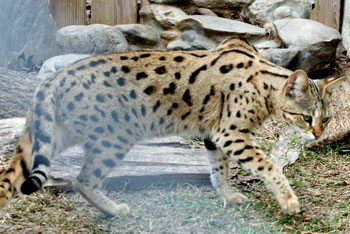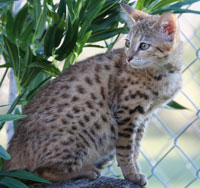Savannah Cat Care & FAQ
Savannah Cat Care
Caring for a Savannah Cat

Despite their exotic appearance, the care of a Savannah cat is not much different than that of other domestic cats. A Savannah cat's primary housing shoud be indoors but they enjoy getting fresh air from a safe enclosure or a walk on aleash once in a while. Savannah cats can be fed a high premium dry and/or wet cat food but some breeders prefer a more natural diet . A high quality nutritional supplement is also a good idea. Make sure to discuss diet with your kittens breeder well before he/she arrives in your home.
Making adjustments for your new Savannah kitten

It will take a little time for your kitten to adjust to his new home. Remember, everything the kitten has grown accustomed to has changed.
Before you bring your new kitten home, you should set up a small, quiet room with a litter box, food and water bowls, and a bed. Kittens/cats should remain isolated for a minimum of two weeks to allow for adjustment to its new home. Each cat/kitten will differ in the time it needs to bond with its new family and new surroundings. Your cat/kitten needs to feel safe and secure to develop it's unique personality.
You will need the same type of food the kitten is used to eating so you won't upset its stomach by changing diet suddenly. Please adhere to the recommended feeding instructions of the cat/kitten for a period of no less than 30 days. I also suggest using bottled water until kitten is adusted.
It is important to use the same litter cat/kitten is accustomed to with having one litter box per cat/kitten.
If you have other cats or pets , you need to plan for a slow introduction. PLEASE keep your new kitten away from all of your other pets for at least two weeks. This gives the kitten a chance to feel safe. It also allows your other pets to get accustomed to the smell of the new kitten. Be sure to supervise the introductions and be prepared to put the kitten back into it's room if things get too rough. Do not leave your new kitten alone with other pets until you are absolutely sure that they will get along.
We will do our best to educate you about the physical characteristics, traits, and temperament specific to your breed of cat/kitten. It is important to continue socialization of the kitten and provide a safe, exploratory environment.
Maintaining health

Your kitten's future health will be directly influenced by the quality of his/her care. You should have a licensed veterinarian lined up for your kittens health care needs.
Vaccinations are essential for keeping your kitten healthy. Before leaving our home, your kitten has been vaccinated to prevent feline Panleukopenia, Rhinotrachetis, and Calicivirus. A booster at the age of 1 year should be provided. Rabies vaccinations should be given according to your state's legal requirements.
We will send your kitten home with a small bag of the food he/she is accustomed to but if you should decide to change your kitten's diet, make the changes gradually. Kitten's should be allowed unlimited access to dry kibble during the first year of it's life. Allow plenty of freshwater at all times.
A well-groomed kitten is a healthy kitten. Grooming not only keeps your kitten looking it's best but it also makes you aware of any changes in skin, coat, ears, etc. Bathing is not generally necessary but most Bengals and Savannahs will enjoy playtime in the water. Occasionally you will need to clean your kitten's ears using a warm, damp cloth or a baby wipe and a q-tip. Nails need to be trimmed approximately every 3-4 weeks. You can use regular nail clippers to snip the sharp tips being careful not to cut too close.
Adding a new kitten or cat to your home can be a very rewarding experience if you plan ahead for the new member of your family. IF YOU FOLLOW THESE FEW SIMPLE RULES, YOU WILL FIND BRINGING A NEW KITTEN INTO YOUR HOME WILL GO EASILY AND SAFELY.
Frequently Asked Questions about the Savannah Cat
How big do the Savannah Cats get?

Most people are first drawn to the Savannah Cat due to their size but it is hard to describe the size of a Savannah Cat in terms of weight. The Savannah Cat is a very tall, long, and lean cat so the weight can be very misleading. The F1 generation weighs approx. 16 - 20 lbs. Each subsequent generation will decrease in size but will stabilize at the third or fourth generation. The Savannah Cat will grow for three years, the first two years they get their height and length and the third year they will put on muscle and weight. F1's range in size from 17 to 25 pounds. They will stand approximately 16-18 inches at the shoulder and are 22-24 inches long from chest to rump. F2's will range in size from 16 to 23 pounds and will stand 15-18 inches at the shoulder and 20-22 inches long. F3 's will range in size from 14 to 20 pounds and will stand approximately 14-17 inches at the shoulder and 18-21 inches long. F4's and F5's will range in size from 14 to 18 pounds and will stand 13 to 15 inches at the shoulder and 16-18 inches long. Remember, these are all tall, lanky weights.
Do the Savannah cats get along well with other pets and children?

Most Savannah Cats are extremely friendly and social and are a pleasure to be around. If they are socialized properly while young, they will become fast friends with other animals. Due to their high energy levels, Savannahs seem to instinctively get along well with children. However, as with any animal, caution should be taken with children and other small animals in the house.
Do the Savannah Cats use the litterbox?
Savannah Cats, like any other domestic cat, generally have little to no problems using the litterbox. When going to a new home, kittens should be confined to a small room so they will know where to find the litterbox. As with any cat, there is always a chance the cat may refuse to use the litterbox but this is usually due to something environmental.
Do Savannah cats need immunizations?
Savannah Cats require the same immunizations and health care as any domestic breed of cat. Each veterinarian and state will have different vaccination schedules and requirements so you should discuss your Savannah Cat's health care with your local veterinarian.
How long do they live?
Servals have been known to live up to 20 years so there is no reason why a Savannah cat should not live as long.
Do you need a permit to own a Savannah Cat?
Every city, county and state is different so it isup to you to determine if Savannah Cats or any other hybrid is legal where you live.